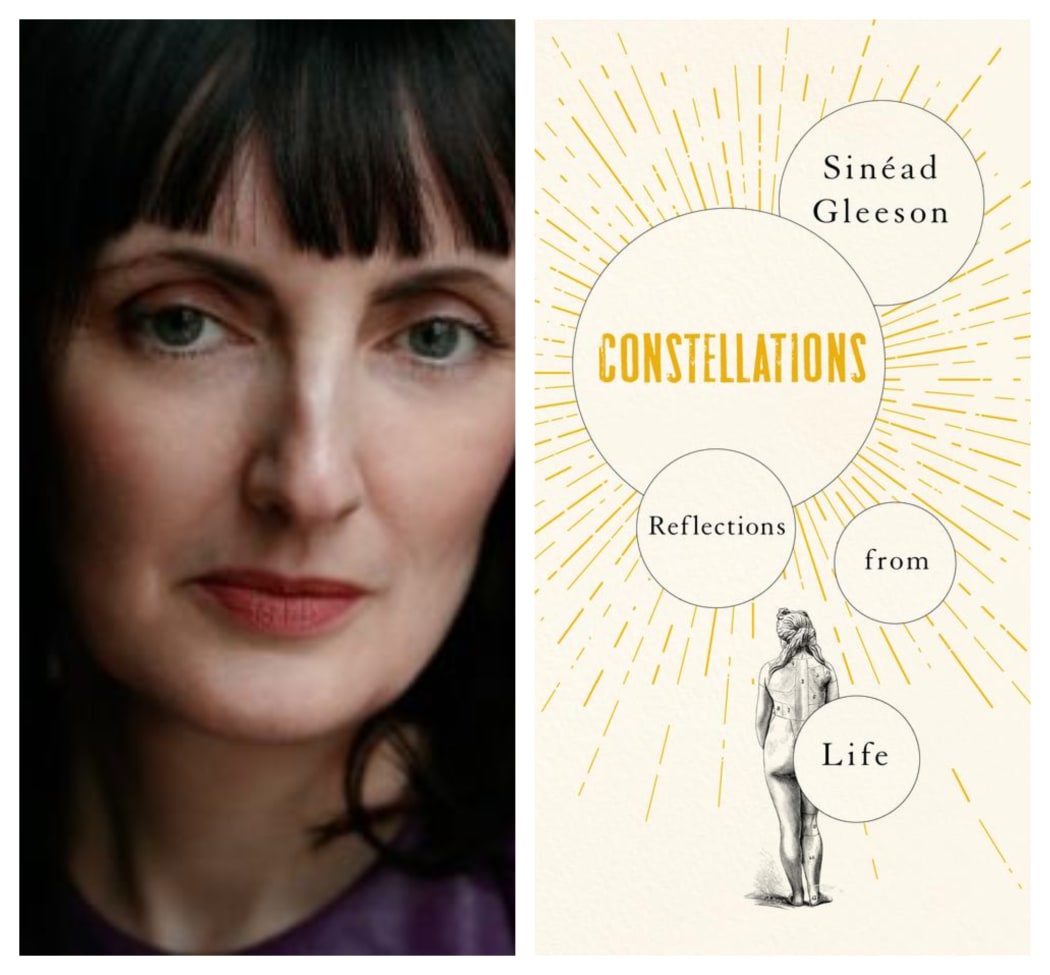Sinéad Gleeson is an Irish writer and the author of the critically acclaimed work of creative non-fiction Constellations. She was diagonosed with arthritis at 13, and an aggressive form of leukemia in her 20s, and her book is a powerful depiction of sickness, health and ultimately motherhood, as well as part science, poetry and art writing.
Gleeson has been a book and music reviewer for The Irish Times', presents The Book Show on RTÉ Radio 1 and is a writer in residence at University College Dublin. She is in Wellington for the annual writers festival Verb.

Photo: supplied
The book doesn’t follow any chronological structure which Gleeson tells Kathryn Ryan reflected the writing process.
“This is a book of essays, and essays by their form can be 8000 words or 2000 words. So, I started writing them individually, not thinking it was going to be a book, but writing about things that interested me.”
It starts with her early teenage years and first encounters with illness.
“I knew very quickly I wasn’t interested in writing a memoir. Memoir suggests to me that you start at the start and end at the end, it’s a very linear, chronological thing. It seemed uninteresting to me.”
“Essays, I always say, look outwards, while memoir looks inwards. That’s why I was interested in doing it the way I did, a sort of mashed up, intersecting way.”
Gleeson says that when she got her leukaemia diagnosis, she wanted to find a way to comfort her mother. She told her, “I’m not going to die, I’m going to write a book.”
“I don’t remember saying that, it was only when I was writing this book that my mother said, ‘do you remember what you said to me in the hospital’, and I said, ‘you know, if I made that up, people wouldn’t believe me.'
“I think with illness and when traumatic things happen to anybody, whether that’s surgery or grief, our brain does provide a kind of amnesiac sort of service -it blots out things that are painful. I think I don’t remember that moment because it was a really painful and difficult moment.”
She says it was perhaps a lifeline to herself to plant that flag in the sand and establish a firm goal.
Mortality, Gleeson says, is a major theme of the book. She’s interested in what constitutes a long life, or a good life.
“I talk about my grandmother and great grandmother who grew up in tenements having multiple pregnancies, total poverty and I compare that to my life now.
“All our experiences are really different, but they do intersect. All the big subjects anybody writes about, whether it’s novels or essays, is love, death, family and grief.”
Gleeson says she was hospitalised with arthritis at age 13 when she was a week into starting at a new school. She was in acute pain and missed three months of school.
“The two things that saved me were music and books. I read voraciously and I listened to music a lot. And I ended up being a music journalist and then a book critic. I built my life around my hobbies, and those hobbies were the things that kept me from going mad when I was unable to get out of bed or in a lot of pain.
“Books, as we know, we read to escape. When you’re stuck in a hospital bed, you can be anywhere in the world if you dive into literature.”
Gleeson says she was a devout Catholic when she was a young girl, even travelling to French holy site Lourdes in hope of a miracle cure, but describes herself as an extreme atheist now.
“If you are a woman and you grow up in Ireland and you look at what has been perpetrated on women and women’s bodies, not just in relation to no contraception and no abortion, but mother and baby homes, forced adoptions - which happened in my own family - I find you can’t reconcile being a women in Ireland with being a Catholic. I know there are many, but I couldn’t possibly.”
She says she never thought the country would see abortion reform in her lifetime, though she believes what was passed last year doesn’t go far enough.
“It’s still not a perfect set up; it’s a twelve week limit, you have to talk to three doctors, it’s very complicated. Even that, having to be interview by three different people to terminate your own pregnancy for whatever reason, strikes me as the kind of thing that wouldn’t happen to men if men could get pregnant.”
However, she thinks the conversations and changes happening now in Ireland are a positive step.
“I say to people that Ireland’s changed in the more in the past 10 years that it has in the last 80 or 90. It’s been quite staggering the rate of acceleration. With the same sex marriage referendum, we were the first country in the world to vote by referendum. In a country like Ireland which has had so many complicated views on morality and sexuality and bodies, that to me is very staggering.”
In spite of the illnesses she’s suffered, Gleeson says she’s lived a full life and done the things she wanted to - one of the most important being having children of her own.
“There’s loads of reasons to have children or not, I just know my life would have been a lot emptier without them.”

